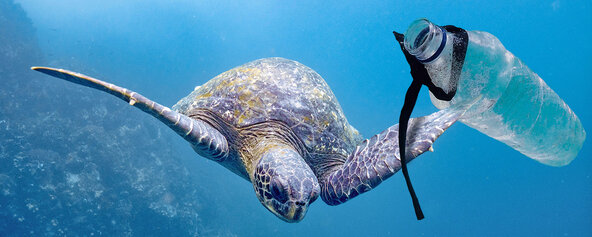
The world’s oceans are polluted by around 150 million tons of plastic debris and the level is increasing every day. Plastic particles are killing marine animals and microplastics are making their way through the food chain into people’s bodies. We cannot accurately assess what impact this will have on our health yet, but countermeasures are urgently needed. DMK has set up several research projects to reduce plastic, including at the Edewecht site, where the development team is proud of its new cheese packaging.
The innovation may only have an impact in the micrometer range, but it is one example of how DMK is working to become more sustainable. The company has managed to reduce the thickness of the lm used in trays for cheese packaging, in the thinner bottom film project. That sees DMK implementing what it set out to do with its OCEAN project, namely reducing the amount of plastic in use, improving recyclability and using renewable and/or compostable raw materials in packaging. The goal is to halt the collapse of ecosystems in the ocean, as there could be more plastic than fish in the sea by 2050, according to the Ellen McArthur Foundation, an awful prospect.
By reducing plastic waste, DMK is not only implementing requirements set out by a packaging law established four years ago. It is also responding to consumer calls for more sustainable packaging. “The days when consumers only cared about protecting the product inside are long gone,” says Dr. Ralf Zink, head of the overarching research and development department Center of Expertise (CoE). “But we cannot compromise on product quality, safety and the requirements of the market when it comes to functionality.” Families still want products that taste good, and they also care about factors such as the best-before date and price. Shifting towards recyclable forms of storage may not come at the expense of people’s household budgets. So DMK joined OCEAN, getting involved in a range of research projects, commissioning studies, workshops and pilot projects and setting up a global network of universities and companies.
The new thinner bottom film for packaging does not only help the environment. “It also cuts costs, as plastic prices are steadily increasing,” says Zink. Now, in Edewecht, all MILRAM and BU Private Label articles are being adjusted, with a 15 percent reduction in packaging film. It saves 17 tons of plastic for every ten million cheese trays produced – the equivalent to the weight of about three elephants. Similar developments are also underway at the Altentreptow and Georgsmarienhütte sites. They are not only reducing thefilm in cheese packaging but are also introducing more recyclable materials. In 2020, switching to mono-material solutions made of polypropylene, known as mono-PP, made it possible to recycle 95 percent of cups and lids for blended spreads, a quantum leap.
Some 650 metric tons of packaging waste can now be recycled. Plus, the paper sleeves on plastic cups can be removed more easily, helping people to separate their trash. The transparent snap-on lids on yogurt are also gone. And OCEAN’s longer-term development projects include developing biobased plastics, made from whey or seaweed, for example. They are just as recyclable as the plastics previously in use but are made from renewable raw materials and would be the final step in decoupling from chemical materials. OCEAN is also about communicating and being more transparent with consumers. Consumers can find out more about all types of plastics, receive recycling tips on packaging, and follow all these changes on DMK’s social media channels. We can only succeed by working together with consumers to reduce plastic pollution in our oceans, to give marine animals a chance to survive this man-made catastrophe.

